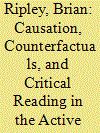| Srl | Item |
| 1 |
ID:
078494


|
|
|
|
|
| Publication |
2007.
|
| Summary/Abstract |
This paper presents a perspective on the application of theoretical and empirical methods to the study of domestic and transnational terrorism. The use of such methods can lead to informed policy making. On the theoretical side, both choice-theoretic and game-theoretic methods are examined. For empirical applications, the paper focuses on the study of trend, cycles, and forecasting. Additionally, the use of intervention analysis in various forms is reviewed with to regards to evaluating policy effectiveness and quantifying the economic impact of terrorism. Although this paper is not intended as a literature review, some key studies are highlighted for readers to pursue in greater depth
|
|
|
|
|
|
|
|
|
|
|
|
|
|
|
|
| 2 |
ID:
078495


|
|
|
| 3 |
ID:
078493


|
|
|
|
|
| Publication |
2007.
|
| Summary/Abstract |
Four years after the fall of Saddam Hussein, many scholars and policy makers concluded that an alliance between Iraq and al Qaeda did not exist. Yet the absence of this alliance raises a puzzle: Given their mutual interest in opposing U.S. hegemony in the Middle East, why wasn't there an alliance between Saddam Hussein and Osama bin Laden? In this essay, we develop an explanation for why Iraq and al Qaeda did not ally using previous scholarly work on bargaining and alliances. Our explanation concludes that Iraq and al Qaeda failed to form an alliance due to mutual fears of opportunism and the problem of credible commitment. We conclude by presenting evidence for our explanation and offering a policy prescription for governments facing threats of state sponsored terrorism.
|
|
|
|
|
|
|
|
|
|
|
|
|
|
|
|
| 4 |
ID:
078492


|
|
|
|
|
| Publication |
2007.
|
| Summary/Abstract |
This article examines Iraq's transitional politics from June 2003 to the Constitutional Referendum of October 2005. It argues that the top-down political transition led by the United States and a narrow group of Iraqi elites was inappropriate for the task of reforming the Iraqi state and building democratic institutions. The article argues that, in countries going through regime change while also radically reforming the state, inclusive transitional institutions and consultative processes contribute to agreements being reached about the future of the state. Such transitions allow actors to guarantee the continued participation of opponents in the political process and to gradually develop agreements on constitutional questions. This did not occur in Iraq. An inclusive political process and a national debate on the country's future did not occur. Rather, a narrow group of political elites led the transitional process in the absence of wide consultations. The article argues that the management of Iraq's transition had an independent impact on the outcome of the transition, namely the failure to reach agreement on the sharing of political and economic power within one state by October 2005
|
|
|
|
|
|
|
|
|
|
|
|
|
|
|
|
| 5 |
ID:
078491


|
|
|
|
|
| Publication |
2007.
|
| Summary/Abstract |
Central to the contemporary American foreign policy debate is the issue of reducing insurgency and promoting stability in Iraq and the role of American military forces in achieving these outcomes. Military force-related proposals range from complete withdrawal to a moderate "surge" in troops to a massive escalation of the force commitment. Here, we draw upon an analysis of domestic political stability in 60 imposed political systems occurring during the period 1816-1994 to forecast the effectiveness of said force-related proposals. The analysis underscores, in part, that (i) a policy of surging American troops is unlikely to succeed, (ii) a policy of belated massive escalation reduces insurgency, but much less so than an initial policy of massive invasion coupled with massive occupation, a strategy that preempts the development of a robust insurgency
|
|
|
|
|
|
|
|
|
|
|
|
|
|
|
|